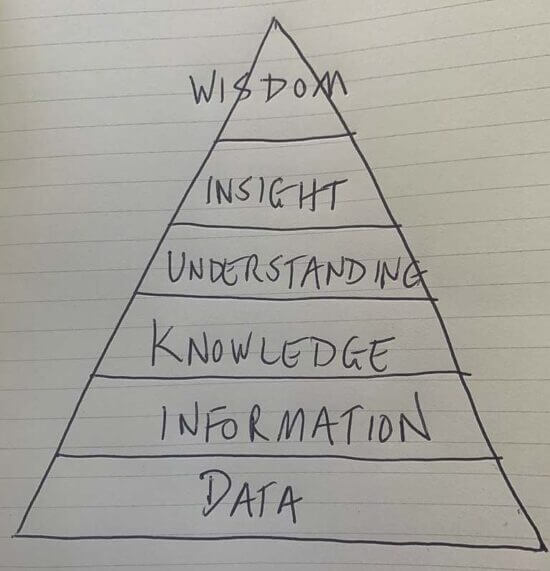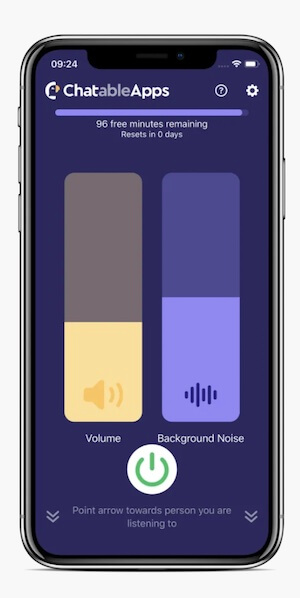
A personal story today to make a point for all of us to be aware of around allowing ourselves to experience sensory overload and the impact that can have.
Oh, and also a recommendation for those who suffer restricted hearing, one which may make a massive positive change for them.
Sitting in the wrong seat
This week I ate indoors at a restaurant with a group for the first time in about six months (due to UK lockdown). I was the first to arrive and the table was tucked up against a corner in this tiny place, so I took the seat in that corner to make it easier for everyone as they came in.
I had arrived at dinner in celebratory mood. After all it was the first meal indoors at a restaurant in ages and we had all looked forward to it for some time, plus I had just that day wrapped up months of renovations on my house, with the last tradesman finishing only thirty minutes prior.
However, as the meal went on, I started to feel really out of sorts. I felt down (very rare for me), frustrated (equally rare), just really, well, “off”. The person across from me noticed I was not my usual energetic and smiley self and asked me if I was ok. They even said I seemed to be sulking. Rather than say nothing, I told them that I felt excluded from the conversation and a couple of other things about how I felt others were treating me. In short, I made it about other people rather than take responsibility for myself, so again, really not like me at all.
It was a strange feeling, I knew something was up, but I had no idea what, I just didn’t feel right, so, feeling not to disrupt the occasion with my mood, I simply sat quietly, feeling pretty bad, anxious, and even depressed. As we left the restaurant, as the rest of the group walked in one direction, the person who had spoken to me before chose to walk in my direction with me. In the quiet of that walk, my head cleared within about ten minutes and I suddenly realized what had been the cause of it. It was simple, I had sat in the wrong seat.
In my decision to sit in the corner to make life easier for others, that seat had my left ear facing the group. That was the problem. You see, I have restricted hearing in that ear. This is, for me, a form of hearing loss where, when I am in a noisy environment with lots of voices, I simply cannot process the noise into understanding what people are saying. What do I normally do to address this? Well, I tend to look to avoid noisy places full of competing voices (such as excited groups out for dinner in a tiny and crowded restaurant!), but if I do not avoid the environment, I take the simple step of sitting with my (good) right ear facing towards the group. As my right ear is excellent, this makes all the difference.
So, what happened to me on that night was that I experienced sensory overload but, after well over a year of the pandemic, I had lost my awareness of this phenomenon, both how to address it in the first place, then how to recognize the effects as it happened. After all, for over 14 months I’ve not been in such spaces at all.
If you read back on my language, I told the person I had felt excluded. This was natural, as I literally couldn’t understand what was being said. I also felt “off”, or off-balance, out of equilibrium. It is noteworthy that the inner ear canal is linked to balance of our physical body, yet I used very similar language around balance due to inability to process the soundwaves coming at me into language, hence I somehow felt people were actively excluding me (which was nonsensical) as opposed to my restricted hearing leading to me feeling excluded from the conversation (which was empirically true!).
A day or so later I was back to normal, but it took that amount of time for me to find my balance fully once again, even though the noisy environment in the wrong seat was only for two hours. In fact, I always have very low-grade tinnitus in that left ear. I can normally ignore it easily, but for about a day my ear was ringing due to the “jolt” this had on me and the connection between my hearing and nervous system. This is the impact that sensory overload can have on me. So, what about sensory overload for you?
A recurring theme for me in my writing on leadership is to do less. Throughout history, the greatest thinkers and most remarkable innovations have predominantly come from people who allow themselves the time to focus on one or two things, as well as to take time out from any thinking and just “be”. However, in our modern world, we allow ourselves to be bombarded with information. In talking to family members at the early stage of their careers, conversation can lead to them saying that two monitors are not enough, they have three, plus some are upgrading to those new curved screens so they can take in more and more data.
More and more data. In more and more roles, we reward people who can process more and more data into information. However, I have concerns about this information flow arms race.
First, from the diagramme at the top, the more data we keep taking in, the less likely we can ascend that pyramid upwards from data to information then to knowledge, then, of highest value, to understanding and ultimately to wisdom.
Second, and really the subject for today, is that when we overload our senses (whether hearing in the case of my story, or simply our brains with the mass of data at work), we put ourselves at risk in other ways. So many people have had to not only cope with personal uncertainty throughout the pandemic, but also with increased workload due to managing through rapid and unpredictable change. This can cause real overload risks, with mental health issues from mild to severe for so many.
I am absolutely no expert on what to do on this, but I know what works for me when I experience sensory overload, and that is to a) remove myself from that overload environment, and b) then be aware of my state and give myself time to come back into equilibrium.
Put in more simple terms, be hyper-aware for yourself and those you lead that everyone is dealing with both potential overload at work and at home. Actively encourage people to take time off, plus model it yourself. Yes, I see firms paying pandemic bonuses to compensate for work, which is great recognition, but I also see some of those firms (yes, I’m looking at multiple global professional services firms here!) continuing to overwork their people and turn down requests for them to take even regular annual leave due to workload demands.
Beware of sensory overload in terms of data ingestion, then also be aware of the multiplicative effect of this occurring both at work and at home for many, plus the cumulative effect at home. In short, take a “time out”, take a break!
Oh, an that closing recommendation for those with restricted hearing. Try Chatable App, a truly powerful AI based smartphone app that totally changes things for many with restricted hearing, particularly those with such hearing loss in both ears. I trialled it for the founders prior to the pandemic and found it to be amazing (even though, with one good ear, I found it a little difficult to adjust to for myself).

